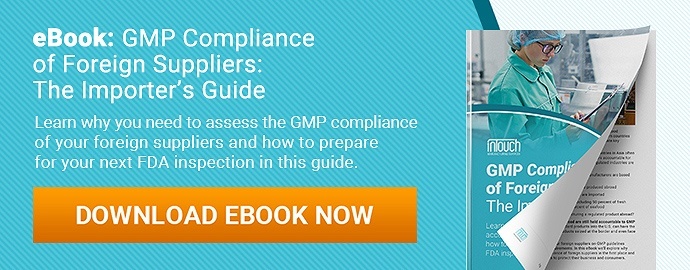 Good manufacturing practice (GMP) compliance is changing. As more manufacturers shift production abroad, the U.S. FDA is increasing its oversight of foreign facilities. Just because you’re manufacturing abroad doesn’t mean you’re not at risk of disruptions due to GMP compliance issues.
Good manufacturing practice (GMP) compliance is changing. As more manufacturers shift production abroad, the U.S. FDA is increasing its oversight of foreign facilities. Just because you’re manufacturing abroad doesn’t mean you’re not at risk of disruptions due to GMP compliance issues.
With the passage of the FDA Food Safety Modernization Act in 2011, the U.S. FDA is mandated to rapidly increase its annual inspections of foreign food facilities.
And it’s not just food manufacturers that are facing greater scrutiny. Starting in 2015, the FDA began inspecting more foreign drug facilities than domestic.
As an importer, you bear the brunt of consequences if your suppliers are found to be noncompliant with GMP regulations. And government agencies expect you to prepare and educate your suppliers to become compliant with their regulations.
How can you assess the FDA inspection readiness of your foreign suppliers?
GMP compliance is becoming increasingly vital. But many importers still aren’t sure how to effectively evaluate their foreign suppliers. Getting reliable insight into the practices and conditions at your suppliers’ facilities can be difficult without having your own team on the ground.
That’s why we’ve written an eBook, GMP Compliance of Foreign Suppliers: The Importer’s Guide, to help you and your suppliers assess FDA inspection readiness before it’s too late.
This 26-page eBook includes insights from several compliance professionals, former FDA employees and GMP auditors to give you the most complete and actionable advice for meeting GMP regulations available.
And don’t worry, we’ve cut out all the dry, regulatory jargon to keep this guide as reader-friendly and clear as possible.
This free eBook covers:
- Who U.S. and EU governments hold accountable to meeting GMP regulations
- What regulations importers must meet and how GMP standards differ from similar international standards like ISO9001
- What are the consequences of noncompliance for importers and manufacturers
- How the FDA assesses GMP compliance of foreign facilities
- How importers can assess the GMP compliance of their foreign suppliers with the help of third-party audits
This guide focuses on U.S. FDA GMP regulations, as these are considered the “gold standard” globally for good manufacturing practice. With an understanding of these requirements, you can gain wider access to markets around the world.
Don’t wait until it’s too late to assess your GMP compliance
Don’t wait until FDA inspectors arrive at your supplier’s factory to uncover GMP compliance issues.
GMP violations can bring all sorts of headaches to your importing business as you rush to identify and fix issues before your products reach customers. A failure to address compliance issues can lead to seizure of your products at customs, product recalls or even criminal prosecution.
A proactive strategy will empower you to be ready for an FDA inspection anytime anywhere. With the help of this eBook, you’ll be well on your way to assessing the GMP compliance of your foreign suppliers and passing a future FDA inspection.
Click the button below to read or download our eBook now!







